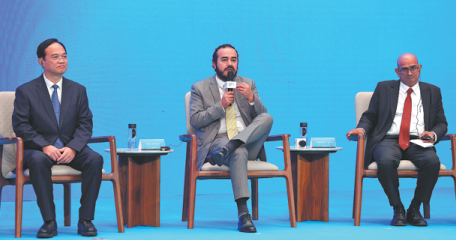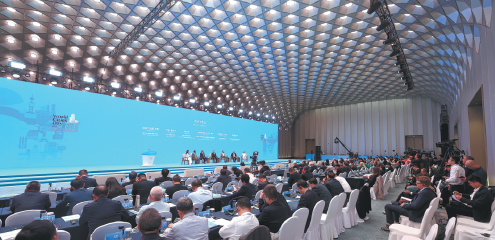China strives to promote sustainable urban development around the world
China strives to promote sustainable urban development around the world
China will push forward with people-centered new urbanization, and is willing to share solutions and experience with other countries to jointly promote sustainable development of global cities, a senior Chinese government official said at the award ceremony of the Global Award for Sustainable Development in Cities (Shanghai Award) on Saturday.
The award ceremony was part of the China Observance of 2023 World Cities Day being held in Shanghai. The event was jointly sponsored by the Ministry of Housing and Urban-Rural Development, the Shanghai municipal government and the United Nations Human Settlements Programme, or UN-Habitat.
Shanghai hosted the global launch of the first World Cities Day in 2014. Over the following decade, a variety of events were held in China each year to mark World Cities Day.
This year's event focuses on exchanging and showcasing policies, experience and practices of cities in China and other countries in implementing the United Nations 2030 Agenda for Sustainable Development and global development initiatives, promoting sustainable urban development and improving the environment.
The event includes an opening ceremony, more than 20 subforums and parallel events, two exhibitions, and city tours. Among the forums are the World Cities Day Forum, the International Forum on Green and Low-Carbon Building Technologies, and the Forum on Urban Environmental Management and Water Environment Sustainability.
Chen Jining, secretary of the CPC Shanghai Municipal Committee, spoke at the opening ceremony. The official said that Shanghai would adhere to the path ofurban development with Chinese characteristics to accelerate the transformation of the development of the megacity and make greater strides in developing the city for its people.
Shanghai will enhance its functions, including promoting the development of the "five centers" and strengthening the "four major functions", aiming to accelerate the green and low-carbon transformation, and realize the harmonious coexistence of man and nature, he said.
The "five centers" refer to the financial center, trade center, innovation center, consumer center and globalization center that Shanghai is developing. And the "four major functions" refer to allocating global resources, initiating technological innovation, leading development of high-end industries and opening up as a hub.
Efforts would be made to improve the effectiveness of urban governance, and to make Shanghai an example of urban modernization and sustainable development, he added.
Ni Hong, minister of housing and urban-rural development, said at the opening ceremony that this year marked the 10th anniversary of the designation of World Cities Day by the United Nations, and the establishment and the presentation of the Shanghai Award by UN-Habitat would lead the development of cities around the globe to foster higher-level achievements in "making cities and human settlements inclusive, safe, resilient, and sustainable".
He said that standing at a new start point, China would continue to make concerted efforts with all partners to promote the sustainable development of cities around the world, so that they could become homes of happiness, green spaces, windows of culture, forefronts of science and technology, and peaceful harbors.
Over the past 10 years, World Cities Day has provided a platform for cities around the world to share experience and expand cooperation, contributing to the accelerated development of inclusive, safe, resilient and sustainable cities.
Maimunah Mohd Sharif, undersecretary-general of the United Nations and executive director of UN-Habitat, delivered a speech at the event.
She said the return of the World Cities Day event to Shanghai after 10 years was of special significance, and the remarkable achievements that Shanghai has made in the Belt and Road Initiative and the people-centered sustainable development had provided global cities with a valuable reference point.
She called on cities to continue embracing the motto "Better City, Better Life" by engaging in dialogues, building partnerships and exploring innovative solutions to build a sustainable urban future.
"We're here providing a platform for cities to share solutions and also the journeys they've walked through and the challenges that they face. We understand that some challenges, such as informal settlement, pollution and employment, are shared and the cities officials can learn and relearn and think and rethink the way that we manage our cities," said Sharif.
On Oct 28, the first circle of the Global Award for Sustainable Development in Cities (Shanghai Award) was unveiled at this session of World Cities Day. Over four months, a total of 54 cities from 16 countries around the world made applications for the award. A total of 15 cities were shortlisted, and five cities — Fuzhou in China; George Town in Penang, Malaysia; Salvador in Brazil; Kampala in Uganda; and Brisbane in Australia — won the awards.
The Shanghai Award is an international award jointly established by UN-Habitat and the city of Shanghai. The theme of the first circle of the award was "Building Sustainable Urban Future for All", aiming to recognize cities that have made significant progress in areas such as economic vitality and urban prosperity, green urban development, urban safety and resilience, and capacity building for sustainable urban development.
This award hopes that countries around the world will join hands and work together to promote the deep integration and connection of resources, better promote the implementation of the United Nations 2030 Agenda for Sustainable Development, and work together to build future cities of sustainable development, organizers said.
Yang Rong, inter-regional adviser of UN-Habitat, said the cities that signed for the inaugural Shanghai Award included those in developed, developing and least developed countries with different levels of development, income and population.
"The excellent practices and achievements of award-winning cities in promoting sustainable development will be included in the best practice library of the New Urban Agenda and displayed and exchanged on more international platforms," Yang said.
"The establishment of the Shanghai Award has opened up a new track," said Wu Zhiqiang, a Chinese expert of the international jury of the award and academician of the Chinese Academy of Engineering, said. He added that the five cities were awarded after multiple rounds of voting by the jury. The sustainable development plans they submitted included detailed tasks to be completed, existing problems, achievable goals, specific steps, among others.
Wu said that the evaluation of cities not only examined how prosperous they were and how developed their economies were, but also benchmarked them against the United Nations Sustainable Development Goals, or SDGs. This required participating cities to determine sustainable development goals, strategies, and implementation methods, and provide successful experiences that could be shared, disseminated and promoted.
In addition to the Shanghai Award, the 2023 edition of the Shanghai Manual and the Shanghai Adapted Index composite indicators were also released at the same time.
The 2023 edition of the Shanghai Manual, centering on "Integrating Resources for Sustainable Future for All", included 24 cases from 14 countries, involving science and technology startup funds, the circular economy, green finance, cultural funds, cultivation of public welfare organizations, public welfare foundations, cross regional governance cooperation, and the Belt and Road cooperation projects.
This year, six cases from China were shortlisted. They are the carbon sink trading of Sanming, the green financial accounts of Quzhou, the micro-renovation of Xiaoxihu Block in Nanjing, the Community Development Foundations in Chengdu, the Shanghai Public Welfare Xintiandi Park and the ecologically vibrant Wanli Community of Putuo district of Shanghai. The Meta-placemaking practice in Shanghai and G60 S&T Innovation Valley of the Yangtze River Delta were also included.
These cases shared many commonalities: in the renewal of urban appearance or the care of urban heritage, all efforts were meticulous, resilient and practical, aiming to present people's and cities' understanding, response, and pursuit of sustainable development.
In order to promote the implementation of the United Nations 2030 Agenda for Sustainable Development and the New Urban Agenda in cities across the globe, and to promote the implementation of the Urban Monitoring Framework, China and UN-Habitat jointly developed the Shanghai Adapted Index to evaluate the progress of urban sustainable development globally and promote the concept of "people-oriented" urban sustainable development.
Unlike traditional evaluation systems, the Shanghai Adapted Index was not solely based on economic scale, but rather was the first urban sustainable development index system of the United Nations based on economic, social and cultural frameworks. It is an important tool for monitoring the implementation of SDGs and the New Urban Agenda.
The Shanghai Adapted Index does not emphasize ranking or comparison. Rather it is an index related to urban progress and coordinated development.
By evaluating and reflecting on the achievements and challenges of cities in sustainable urbanization, it helps cities set or adjust their development priorities, thereby promoting cities to achieve the 2030 SDGs.
Even if a city's economic scale and population size are not the highest, but its development in all aspects is relatively coordinated with good social welfare and high resident satisfaction, it can obtain a high score in the evaluation of the Shanghai Adapted Index.

The China Observance of 2023 World Cities Day opens in Shanghai on Saturday. CHINA DAILY

Mayors share their cities' sustainable development practices in a discussion during the event. CHINA DAILY








